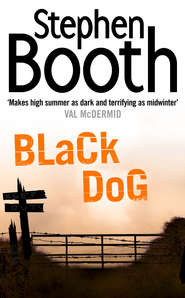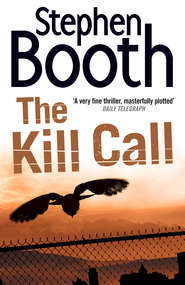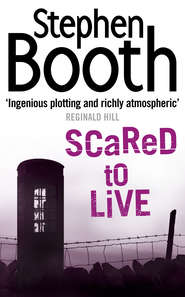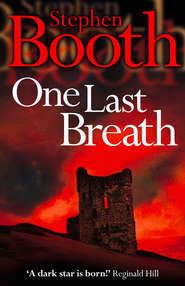По всем вопросам обращайтесь на: info@litportal.ru
(©) 2003-2024.
✖
Cooper and Fry Crime Fiction Series Books 1-3: Black Dog, Dancing With the Virgins, Blood on the Tongue
Автор
Год написания книги
2018
Настройки чтения
Размер шрифта
Высота строк
Поля
‘And now a trainer.’
‘Yes, that’s all we’ve got so far, but it looks hopeful. We’ve got Ben Cooper on the spot there – he was with one of the search parties. Ben’s got good judgement.’
‘I’m sure he has.’
‘Oh, you’ve met Cooper, have you? He’s only back from leave today.’
‘No, but I’ve heard the others talk about him.’
‘Right.’ Hitchens said nothing for a few minutes, negotiating a crossroads where heavy lorries thundered by at regular intervals, dusting the roadside verges with a coating of lime. Fry tried to read his thoughts, wondering if she had said something wrong. But she was sure of her ability to keep any emotion out of her voice. She had practised long and hard, and now, she felt, she only ever sounded positive.
‘How’s it going then, Diane? Settling into the CID room OK?’
‘Fine, sir. Some things are done a bit differently from what I’ve been used to, but nothing I haven’t been able to pick up on pretty quickly.’
‘That’s good. Dave Rennie treating you all right?’
‘No problem,’ said Fry. She noted that she had become ‘Diane’ since getting into the car alone with the DI. She liked to keep a track of these things, in case they had any deeper meaning. Maybe she could manage without the ‘sir’ in return, and see if it struck the right note – a closeness of colleagues rather than a senior officer with a junior. But no further.
‘Not finding Derbyshire too quiet for you after the West Midlands?’
‘It’s a nice change,’ said Fry. ‘But I’m sure E Division has its own challenges.’
Hitchens laughed. ‘The other divisions call it “E for Easy Street”.’
Fry had already been informed by her new colleagues that Edendale had been chosen over Bakewell or Matlock as E Division Headquarters for purely alphabetical reasons. It was one of the oddities of the Derbyshire Constabulary structure that the territorial divisions were all based in towns that began with the right letter – A Division in Alfreton, B Division in Buxton, C Division in Chesterfield and D Division in Derby.
So it was inconceivable that E Division should have been based in Bakewell or Matlock. It would have been an outrage against corporate neatness. In fact, if there hadn’t already been a town called Edendale, some PR person in an office at County HQ would have had to invent one.
‘But I was thinking of the social life,’ said Hitchens. ‘Edendale isn’t exactly the night spot capital of Europe. A bit tame after Birmingham, I expect.’
‘It depends what you’re looking for, I suppose.’
He turned to look towards her, his hands resting casually on the wheel. ‘And what is Diane Fry looking for exactly?’
What indeed? There was only one thing that Fry wanted to acknowledge to herself. Maybe it wasn’t what Hitchens was expecting to hear. But it was something he ought to know, now rather than later.
‘I want to advance my career,’ she said.
‘Ah.’ He raised his eyebrows, a smile lighting up his face. He was quite good-looking, and he wore no wedding ring.
‘I’m good at my job,’ she said. ‘I’ll be looking for promotion. That’s what’s important to me. At the moment.’
‘Fair enough. I like your honesty.’
The main road towards Buxton climbed and climbed until it reached a plateau where the limestone quarries competed with the moors as background scenery. There was a well-placed pub here called the Light House, with tremendous views over two neighbouring valleys and the hills beyond. Hitchens turned off the road before they reached the quarries, and they began a gentle rollercoaster ride over smaller valleys and hills, dipping gradually towards Wyedale. Farm gates flickered past occasionally, with black and white signs advertising the names of dairy herds and stacks of huge round bales of straw or black plastic-wrapped silage lying in the fields behind stone walls.
‘I’ve seen your record, of course,’ said Hitchens. ‘It’s not bad.’
Fry nodded. She knew it wasn’t bad. It was damn good. Her exam results had been in the top few per cent all along the line. Her clear-up rate since her transfer to CID had been outstanding. She had had a good career lined up in the West Midlands, and they had been grooming her for big things; anybody could see that.
‘It was a pity you had to leave your old force,’ said Hitchens.
She said nothing, waiting for the comment that she knew would have to come.
‘But it was understandable. In the circumstances.’
‘Yes, sir.’
In the circumstances. That was exactly how Fry herself tried to think of it now. ‘The circumstances’. It was a wonderfully cool and objective phrase. Circumstances were what other people had, not something that turned your life upside down, destroyed your self-esteem and threatened to ruin everything you had ever held as worthwhile. You couldn’t get upset about circumstances. You could just get on with life and concentrate on more important things. In the circumstances.
They were driving along a ridge now, with a steep drop on one side down rock-strewn slopes to a little river. Gradually the view became more and more obscured by trees. Here and there was a house set back from the road, not all of them working farms.
‘No ill effects though?’ said Hitchens.
Fry couldn’t really blame him for fishing. She had expected it sooner or later. The subject had been raised at her interview, of course, and she had answered all the carefully worded questions with the proper responses, very reasonable and unemotional. But it was bound to be in the minds of those, like DI Hitchens, that she had to rely on for her prospects of advancement. It was just another hurdle she had to get over.
‘None at all,’ she said. ‘It’s all behind me now. I don’t think about it. I just want to get on with the business in hand.’
‘One of the hazards of the job, eh? Goes with the territory?’
‘I suppose you might say that, sir.’
He nodded, satisfied. For a brief moment, Fry wondered how he would react if she did what a tight little angry knot deep inside her really wanted to do – screamed, shouted, lashed out with her fists to wipe the smug smile off his face. She was proud that she no longer did that; she had learned to keep the knot of anger tied up tight and secure.
The houses suddenly grew thicker on either side of the road, though there had been no sign to indicate they were reaching a village. There was a small school off to the right, some farm buildings converted into craft workshops and a tiny village post office and store in an end terrace cottage. The square tower of a church appeared over the rooftops, surrounded by tall, mature chestnut trees and sycamores.
They found a cluster of cars and vans parked in a gravel layby. As soon as Hitchens pulled up, a sweating PC Wragg appeared at the window of the car. He was clutching a polythene bag containing a Reebok trainer.
‘Wragg? Where’s DC Cooper?’
‘The old bloke’s showing him where he found it, sir.’
‘What’s he playing at? He should have waited,’ said Hitchens.
‘The old bloke wouldn’t wait. He said it was dominoes night, and it was now or never.’
‘Dominoes night?’
Wragg looked embarrassed. ‘He really seemed to mean it,’ he said.
The section of footpath looked much the same as any other. It had a dry bed of dusty soil, embedded with twisted tree roots that broke through the surface to form steps in the steeper places. There were oaks and birches clinging to the slopes on either side, with swathes of dense bracken clustering round their trunks. A tumble of huge rocks lay half hidden among the bracken, like the overgrown ruins of a Stone Age temple. Birds skittered away among the undergrowth, chattering their alarm calls, and there was the constant background hiss of a fast-running stream.
‘Aye, about here,’ said Harry.
‘You’re sure?’
‘I reckon.’











